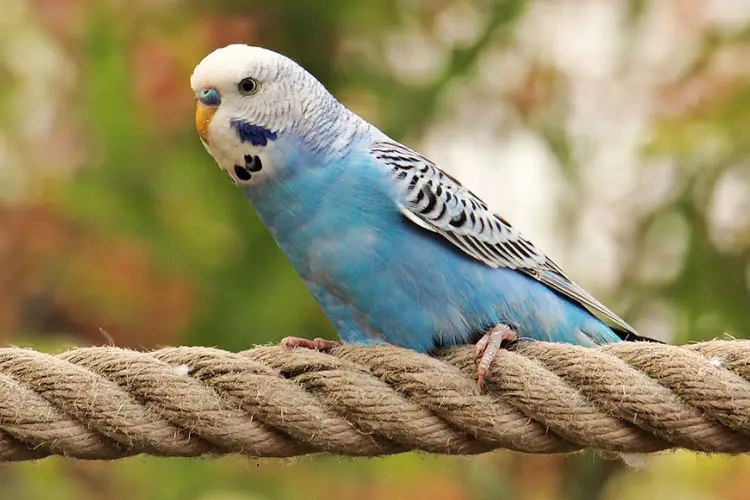The budgies are social creatures, so even though they’re initially scared, early socialization makes budgies feel safe around humans and bond better with their owners.
Do budgies like to be held? Yes, budgies like to be held and cuddled. But you need to do it in the right way. It shouldn’t feel like being grasped or grabbed. When they get accustomed, they’ll want to come in touch, hop on the owner’s hands, and nuzzle against their body. After spending enough time and providing good care, they’ll start cuddling you and climbing around your body.
However, they don’t like to be touched in some places and times. So avoid holding or touching them when they show signs of dissent, as it can leave a wrong impression. To find out how to make your budgie enjoy holding, petting, and cuddling, check out the article here.
How Do Budgies Like to be Held & Cuddled?
Budgies are cuddly pets, and they enjoy getting attention for their owners. They’ll like to get rubbed, cuddled, and receive sweet kisses from you. But you must know how to hold correctly, touch, or cuddle the budgies. Here are a few things you can consider to show affection to your feathered friend.
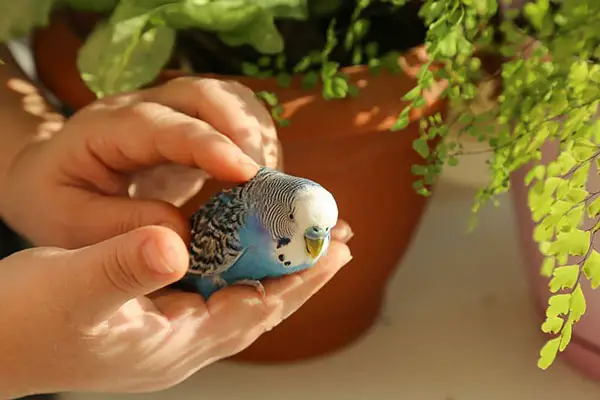
Offer Finger, Hand, or Shoulder to Perch
Finger training should be the first step in holding your budgie. Once you’ve spent enough time around it trying to talk and interact, you can offer your index finger to it to use as a perch inside the cage.
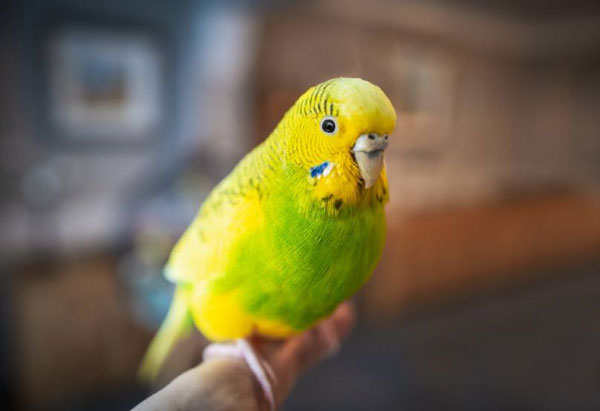
One way to make it hop on your finger is by rewarding it with millet, dried fruit, or seed stick. Gently push the finger against the chest while holding the treat with the other hand. Once it gets used to it, you’ll also see it perching on your shoulder.
Rub or Cuddle
You can also rub the neck of your budgie affectionately and nuzzle it against the chin to cuddle. Your budgie should like these behaviors as they are cuddly pets.
Kiss
Kissing or giving them a quick peck on top of the beak or head is completely fine and is a delightful way to show affection towards your feathered friend. That said, always avoid kissing them on the mouth or inside as it can increase the chance of contamination from human saliva. Also, don’t kiss them if they show a sign of disliking.
Where Do Budgies Like Getting Petted & Touched?
You need to know the favorite spots of your bird to pet or hold it. They typically like to be petted at the neck, under the wings (only pet, not grasp), and along the chest. If you rub the soft feathers along their neck and chest, they’ll like it as it’ll resemble their natural preening behavior.
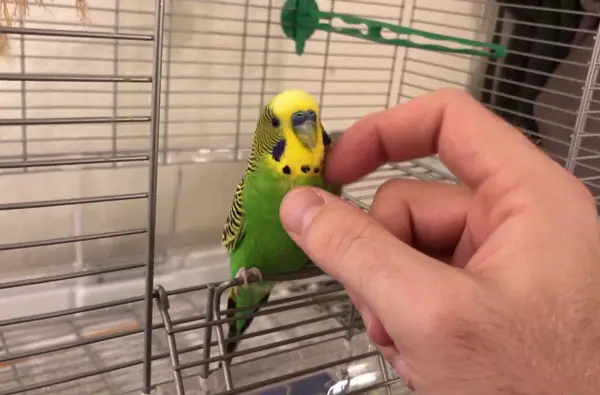
You can pet underneath the wings of the resting budgie or one that completely trusts you. If they’re holding the head down for you, you can also pet the head. They’ll sometimes snuggle their head against the neck or hold their heads up to let you scratch the neck.
Also read: Why Does My Budgie Nibble My Finger?
Where Should You Not Hold or Touch the Budgie?
Don’t hold your budgie by the legs, tails, or wings. If you want to bring them out for some necessity, but they’re refusing to hop on or step up, use a small towel to grasp them gently. They’ll still not like it, but you can protect your fingers from scratches or bites.
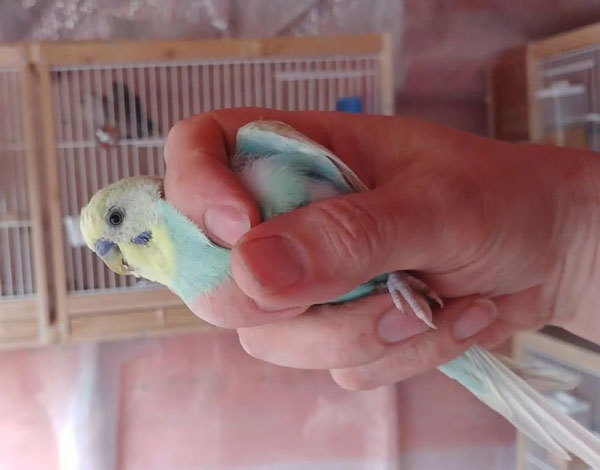
Budgies also don’t like to be touched in areas they can’t see, like the head or back. These places shouldn’t also be touched because they can be hormonal and are reserved for courting. Budgies are also protective of their feet; petting them can make your budgie step or fly away.
How Can You Make the Budgie Bond Better with You?
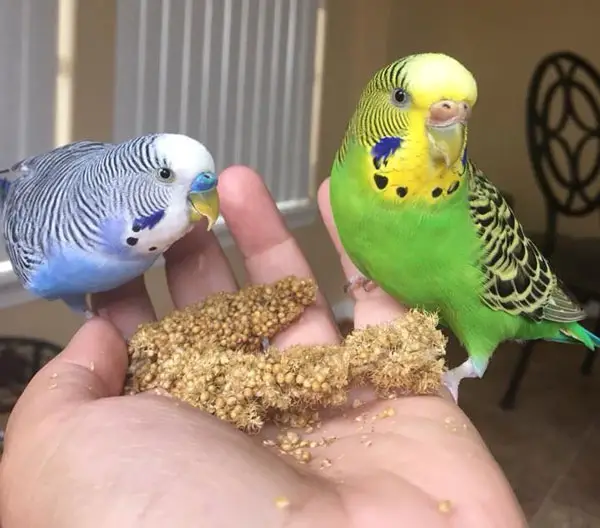
Every owner wants to make a strong bond with their pet bird. Here’s what you need to do:
- Spend more time socializing with it by taking it out of the cage. Cuddle and play with it as often as possible.
- You can take some time to train your budgie to talk, imitate sound, and also allow climbing fingers, pockets, or sleeves.
- Share tasty treats like millet, oat, seed sticks, sprouts, or dried or fresh fruit. Associate the meals with some cuddling.
- Keep the budgie’s cage open for a fair amount of time, as it can have more chances to snuggle with you. But ensure the doors and windows are closed, and no other pets are around.
- Help your budgie groom by providing birdbath, crippling fingernails, and trimming the beak (if needed). Also, keep them in a peaceful environment since they’re sensitive to loud noises.
- When they’re cuddly and affectionate, try to appreciate them by giving rewards like food treats or playing with toys. Don’t punish or scold them with a raised voice.
How Do You Know Your Budgie Likes You?
Your budgie will allow you to hold it happily when it likes you. But how do you know the budgie likes you? Here are a few signs of affection to check out.
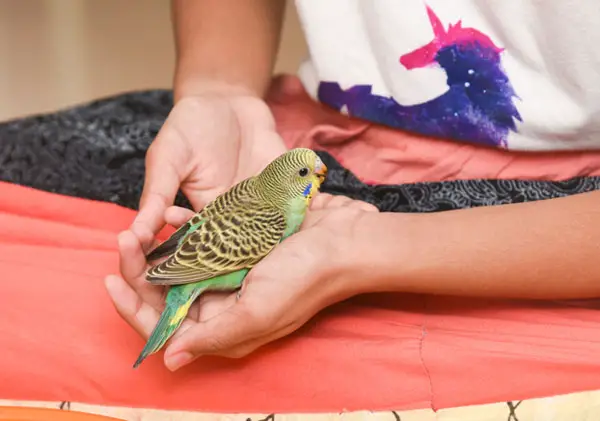
- Cuddling is a clear sign of trust that means your budgie likes you and is ready to bond with you.
- If the bird likes you, it’ll also nuzzle against your chin, chest, or hand.
- Climbing around on the body also shows he’s fond of you.
- You can also understand your budgie likes seeing his body language, such as sweet sounds, flashing eyes, and flapping wings or tails out of happiness.
How Do You Know Your Budgie Isn’t Accustomed to You Yet?
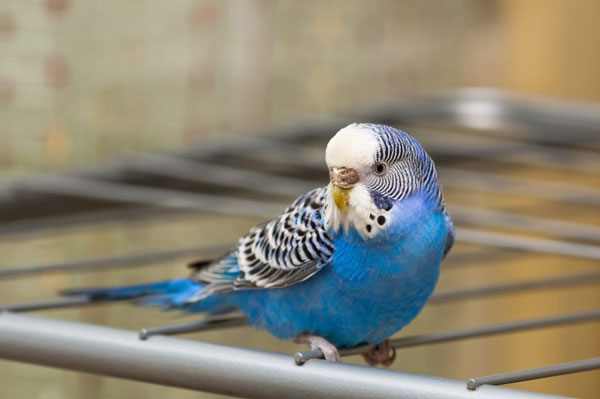
There are also signs that indicate your budgie is yet to get accustomed to you and won’t be comfy letting you hold it. Some of these include:
- Jumping and flying in the cage crazily
- Attempting to bite finger when tried to touch
- Feeling nervous after seeing you
- Flapping the wings crazily in response to your approach
- Frequent screaming.
Related: How Often Do Budgies Poop?
FAQs
Here we’ve got a few FAQs answered on the topic. Let’s check out.
Spending adequate time with your newly arrived budgie will usually take it a week to get accustomed to you. After one week, offer it your finger to perch on or hold it with a towel to see how ready it is to be held.
Yes, budgies can bite if they think your approach is invasive. Allow them some time before you try to hold them, and initially, use a towel to hold them and avoid getting hurt by painful bites. Read out the article on how to manage parrot bites.
Final Words
Most bird enthusiasts love keeping budgies as pets due to their affectionate nature. And they can quickly get accustomed to their owners and love being held and cuddled. But you can’t hold by any part of the body as they like certain parts to be touched, held, or petted, typically along the neck and chest.
Their favorite interaction with the owners is hopping on the finger or hand, nuzzling the head against the body, and climbing the shoulder. They don’t like to be grabbed or grasped, and there are also places they don’t like to be touched. So make sure you’re touching or holding them in the right way to avoid getting bitten or leaving any lousy impression that can delay your bond with the feathered friend.
